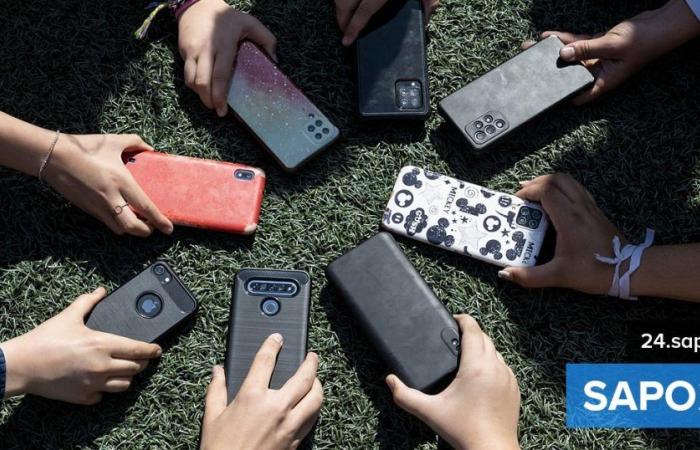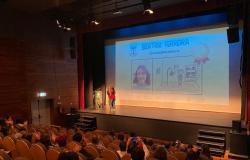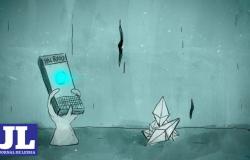Speaking to the Lusa agency regarding the Digital Wellbeing Week, which starts on Monday, the specialist in the use of information technologies by children and young people and founder of the MiudosSegurosNa.Net project, Tito de Morais, considered that the best It is always listening to young people first, before making any decision, even to hold them accountable and make them comply with the decision.
Also Cristiane Miranda, who has more than 20 years of experience in this area and is a mentor for the Teen On Top – Coaching for Young People project, argues: “we think that [proibir] is not a better solution.”
“It is not the best solution to say that the State has to come and regulate and simply ban the use of cell phones in schools”, said the expert, adding: “when we go to schools and talk to students, they have a lot to say and have solutions.”
And he explains: “Each school is sovereign to decide what it should do, but listening to everyone involved, from teachers, teaching staff, non-teaching staff and the students themselves, and see what the best solutions are.”
The specialist also recounted one of the conversations with one of the young people from a school that the project visited. “We asked if it should be banned and the young man replied: ‘it depends on the weather. When it’s sunny, we can be outside, run, play ball and do other things, but when it rains we have to stay inside the pavilion and we can’t talk, we have to sit here and no one lets us do anything and then we have to use our cell phones’”.
He insists that, when young people are involved in the solution, “they accept it better and join in fulfilling it”.
Furthermore, he states, “if we just prohibit them we also don’t teach them how to use these technologies well”.
This topic will be the subject of discussion at the international conference taking place on the 3rd and 4th of May at the Cupertino de Miranda Foundation (Porto), within the scope of Digital Wellbeing Week.
The debate on the use of cell phones in schools will be attended by representatives from the National Association of Directors of Groups and Public Schools (ANDAEP), the National Confederation of Parents’ Associations and the author of Mónica Pereira, author of a petition asking for the the end of cell phones in 5th and 6th year recess and which has already been signed by more than 22 thousand people.
A school in Lourosa, in Santa Maria da Feira, was the first in the country to ban the use of cell phones throughout the premises, seven years ago. Since then, the limitation has already been extended to others, such as, for example, the Escola Básica EB 2,3 General Serpa Pinto, in Cinfães, in the district of Viseu, the basic schools of Alto de Algés and Miraflores, both in Oeiras, the Gil Vicente (Lisbon) and Infanta D. Mafalda (Gondomar) school groups, as well as the Almeirim (Santarém) school groups.
The controversy raised by the topic led the Ministry of Education to request, last year, an opinion from the Schools Council, which considered that the solution to respond to the negative impacts of the use of cell phones in school contexts does not involve prohibiting their use, but argued that the groups themselves should decide.
Despite the negative impacts and “complex issues of discipline, namely the inappropriate capture of images or cyberbullying” that arise with the widespread use of cell phones, especially from the 2nd cycle onwards, the directors emphasize that there are, on the other hand, , positive aspects.
In the classroom, they state, ‘smartphones’ can constitute “resources available to students and teachers to promote learning” and allow “to enhance the development of essential skills in accordance with the Profile of Students Leaving Compulsory Schooling”.
Expert warns parents that there are children with free access to pornography on the internet
Digital well-being specialist Cristiane Miranda warned today that parents should be more aware of the dangers that young people face on the internet, highlighting that there are children under 10 years of age with free access to pornographic content.
“Parents are often unaware of the implications of children having a cell phone in their room”, stated the specialist, adding: “young people are having access to it at an increasingly earlier age, and in a very free way, because For example, pornography and not just images”.
These videos, which young people have free access to at an increasingly earlier age – “before the age of 10” – “are already having implications for relationships between people”, he said.
“It’s going to be something very serious coming and we think that parents are very distracted when it comes to this, especially because it’s a taboo topic”, he stated, stressing: “they think that by talking to their child they will open a box of Pandora, but perhaps the box is already open and the parents are not aware.”
He also argued that, to protect children and young people, there will have to be “more regulation and tighter legislation on the part of technology companies”, remembering that younger people, biologically, are more vulnerable because their brains are not fully developed.
“We often say that parents should be their children’s prefrontal cortex, which is that area of the brain that is the last to be developed. We must do our part, in the same way that we tell a child that they cannot eat a chocolate bar during dinner, we must also do the same regarding the time they spend in front of screens”, she defended.
The expert considered that the response to these problems will have to be multiple, ranging from “parental, regulatory, educational and technological solutions”.
“Solutions have to come from everyone, but parents here have to be very attentive because they have an increased responsibility in the education of their children”, he highlighted.
He recalled that at the international conference taking place on the 3rd and 4th of May at the Cupertino de Miranda Foundation, in Porto, this topic will be addressed, “giving practical resources to parents to help their children manage these situations better”.
Online crimes are highlighted in the most recent “Annual Internal Security Report” (RASI), whose data were published in the latest edition of the newspaper Expresso.
According to the newspaper, the report reveals the existence of investigations into the use of online gaming platforms that serve to entice minors to produce pornographic content, “using encrypted platforms to exchange and store illegal content”, as well as “ self-production of sexual exposure files of minors, following ‘grooming’ activities [em que um pedófilo convence um jovem a despir-se ou a filmar um ato sexual] or coercion.”
Digital well-being week starts on Monday and closes with an international conference in Porto
An international conference on preventing and combating online sexual violence against children and young people and the excessive and problematic use of screens will be the highlight of Digital Wellbeing Week, which kicks off on Sunday.
Organized within the scope of the Agarrados à Net project, which promotes the digital well-being of children, young people and adults, preventing and combating ‘bullying’ and ‘cyberbullying’, as well as sexual violence based on images and the negative impacts of social networks on body image, Digital Wellbeing Week aims to raise awareness of the topic, placing it on the national public agenda.
The 2nd edition takes place between April 28th and May 4th, worldwide.
In Portugal, initiatives promoted by participating entities are planned, such as the dissemination of resources on how families, schools and communities can improve digital well-being, a website dedicated to the topic and an international conference, at the Cupertino de Miranda Foundation, in Harbor.
At the conference, which takes place on May 3rd and 4th, topics such as “Sexual grooming – sexting and online sexual extortion of children and young people” will be discussed, “Non-consensual sharing of intimate content: sexual violence based on images” , “Artificial Intelligence and Abuse and Sexual Exploitation of Children and Young People”, “How Google and YouTube combat sexual abuse of children online” and “The impacts of screens on the development of children and adolescents”, among others.
“Last year we felt that there was a need to create an event that centralizes all this information, on an annual basis, and the idea came up of creating digital well-being week, to mobilize society”, Tito Morais, founder of MiudosSegurosNa.Net, adding that the intention is “to involve as many organizations as possible”.
As an example of promoting school involvement, he pointed to the creation of the School Seal for Digital Wellbeing, awarded to educational establishments that promote initiatives on these topics.
“We really encourage schools, because (…) they reach a larger audience in terms of the number of children, but any person, family or individual, can commit to improving their digital well-being during this week, or even during the month”, explained Cristiane Miranda, creator of the Teen on Top project and also involved in organizing the Digital Wellbeing Week.
He said that there is still a great “lack of awareness among parents” regarding the scale of the risks and how harmful the excessive use of screens and technologies can be, exemplifying the type of content that children and young people have access to today, with ease, on the internet, highlighting that the impacts “are physical and mental”.
The day before the start of the international conference, on May 2nd, two specialized workshops will be promoted with the theme “Preventing and Combating Online Sexual Violence Against Children and Young People in the Metaverse”. Participation in these actions is free, but to participate in the conference you pay a “symbolic value” of around 15 euros. For teachers, training is certified as a short-term action.
A report published in February 2024 by the Faculty of Social and Human Sciences at Universidade Nova presented the results of a study that was part of the European project ySKILLS, carried out between 2021 and 2023, which covered more than 10 thousand participants between 11 and 16 years old , which concluded that four in five Portuguese teenagers have come across hateful or harmful online content.
The international conference will also discuss ‘digital parenting’, giving parents tools to monitor their children and protect them from the risks lurking on the internet. In this area, Elisabeth Milovidov, considered one of the world’s greatest experts in this area, will be at the conference.
“We did this precisely on Saturday, thinking about the parents, so there would be no excuses”, Cristiane Miranda told Lusa, adding: “We are developing the topic in the country’s schools, we always do a session with the parents and we see the difficulty they face. schools have to take them to a session like this. Even from a distance and with different schedules.”
“We go to schools with around 2,000 students and in one session we can’t even have 20 parents”, he insisted, highlighting the need for greater interest and willingness on the part of parents to participate: “The problem is not that parents don’t know. It’s because parents don’t want to know.”






